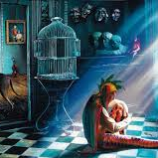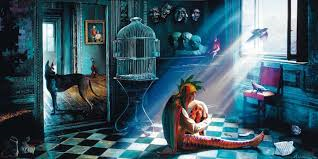In the universe there is an immeasurable, indescribable force which sorcerers call intent. Absolutely everything that exists in the entire cosmos is attached to intent by a connecting link. Sorcerers, warriors, are concerned with discussing, understanding, and employing that connecting link. They are especially concerned with cleaning it of the numbing effects brought about by the ordinary concerns of their everyday lives. Sorcery at this level could be defined as the procedure of cleaning one’s connecting link to intent.
The only way to know intent is to know it directly through a living connection that exists between intent and all sentient beings. Sorcerers call intent the indescribable, the spirit, the abstract, the nagual.
This process of cleansing is extremely difficult to comprehend. Sorcerers, therefore, divided their instruction into two categories. One was instruction for the everyday-life state of awareness, in which the cleaning process was presented in a disguised fashion. The other was instruction for the states of heightened awareness, such as the one I was presently experiencing, in which sorcerers obtained knowledge directly from intent, without the distracting intervention of spoken language.
Knowledge without words or thoughts
I want you to understand the underlying order of what I teach you. It means two things: both the edifice that intent manufactures in the blink of an eye and places in front of us to enter, and the signs it gives us so we won’t get lost once we are inside.
Obviously, what the sorcerers call subtle manifestations or subtleties of the spirit is something you will learn from now on. These subtleties occur in the ulterior created by intent for you to enter.
According to rule, the subtleties of spirit and the stories of sorcery should be told at this point. And someday knowledge without words, or the ulterior of intent will be revealed to you through the stories themselves. The ulterior I mentioned is where you will communicate with the spirit directly, without the intervention of language.
The crux of our difficulty in going back to the abstract is our refusal to accept that we can know without words or even without thoughts. To accept this proposition is not as easy as it may seem. The whole of humanity has moved away from the abstract, losing their intuitive capacity. This was our sustaining source at one time. Then something happened and pulled us away from the abstract. Now we cannot recover this connection. It takes years for an apprentice to be able to go back to the abstract, that is, to know that knowledge and language can exist independent of each other. Knowledge and language are separate.
There is no way to talk about the spirit because the spirit can only be experienced. Sorcerers try to explain this condition when they say that the spirit is nothing you can see or feel. But it’s there looming over us always. Sometimes it comes to some of us. Most of the time it seems indifferent.
Your problem is that you consider only your own idea of what is abstract. For example, the inner essence of man, or the fundamental principle, are abstract to you. Or maybe a little less vague, such as character, willpower, courage, dignity, honor. The spirit, of course, can be described in terms of all these things. And that is what is so confusing is that it is all these things and none of them.
What is considered abstractions are either the opposite of all the practicalities of what you can think or decide to not have concrete existence. For a sorcerer an abstract is something with no parallel in the human condition.
For a sorcerer, the spirit is an abstract simply because he knows it without words or even thoughts. It’s an abstract because he can’t conceive what the spirit is. Yet without the slightest chance or desire to understand it, a sorcerer handles the spirit. He recognizes it, beckons it, entices it, becomes familiar with it, and expresses it with his acts.
The root of your misconception is that I used the term “abstract” to describe the spirit. To you, the abstract is words that describe subjectivity. An example is the word “spirit,” which does not describe the reason or pragmatic experience, and which, of course, has no use to you but to stimulate your imagination.
Related Articles














